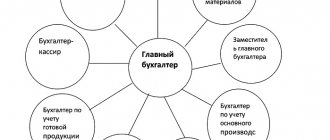Executive Director position
An executive director is one of the leaders of the organization, a top manager. In fact, in most situations, this position is analogous to a general director or director; it differs in the list of powers, rights and area of responsibility. In each company, the responsibilities and functions of such a specialist are determined individually in the statutory documentation.
So he can be the only head of the LLC and report to the meeting of founders, or he can be the second person after the general director and report to him. There are many options, they are not limited by law. When forming management staff, owners proceed from their own considerations of profit.
The occupation codes of this manager do not differ from the standard director or manager - 21495. The order of appointment is signed by the general director.
The responsibilities of the executive director depend on the wishes of the company owner and may vary significantly from company to company.
Responsibilities
The terms of reference of the top manager are determined by the statutory documentation. What exactly to include in it is decided by the founders of the organization. As a rule, the executive manager is entrusted with solving operational problems and monitoring day-to-day work, daily operational activities and the preparation of internal reporting.
The appointment of such a specialist is only relevant for large companies where 1 manager is not enough. He is entrusted with solving tactical issues, he is not involved in strategy, planning, or selecting personnel, but he can work on motivating the staff.
The executive director's job description includes the following sample list of responsibilities:
- manages day-to-day financial and business operations;
- organizes the implementation of plans (production, sales, optimization);
- introduces new standards;
- monitors compliance with production and service standards;
- controls the implementation of assigned tasks by structural units;
- increases the efficiency of interaction between departments, workshops, and areas;
- manages individual divisions on behalf of the CEO or board of founders;
- works to motivate staff;
- analyzes the effectiveness and quality of implementation of plans in practice.
Often participates in the development of the company's strategy, helps select personnel, and informs the meeting of founders about current results. The work of this manager is distinguished by efficiency and the practical nature of the tasks being solved.
Download the job description: Job description of the executive director
Professional Skill Requirements
An executive director (in English, Executive Director) is a generalist. His professional skills combine multitasking, high speed decision-making, leadership qualities and knowledge of psychology. The practical nature of the work of such a leader eliminates slowness and indecision. This is not an “office” employee, not the “face of the company.” During the day, he changes his location several times, being present where he is most needed at the moment - at a meeting, in a department or on a workshop.
Professional education can be of any kind, but faculties of management, administration, economics or law are welcome. Sometimes managers complete advanced training courses that help them achieve a higher level of competence. For example, understand tax legislation or the government procurement system.
The resume of a potential executive director should contain leadership experience, as well as successfully implemented projects that the candidate has supervised. The salary is high, as a rule, depending on the success achieved.
The executive director resolves operational issues and works to motivate staff
Differences from the CEO
What is the difference between an executive director and a director? As a rule, the difference lies in the range of tasks performed and powers. The General Director is given the right to sign documents and is engaged in strategic planning of the company. Executive - controls the implementation of these plans in practice, conveys them directly to employees, and thinks through ways of implementation.
It should be understood that the distinction from the CEO may be different in each individual organization. This is recorded in the statutory documentation and job descriptions of managers. The executive director reports to the general director, but never vice versa. By proxy, he can sign documents or represent the organization in regulatory institutions.
The CEO can be compared to the head of the company - he works on the development strategy, signs documents, and officially represents the organization at events. In this case, it is appropriate to compare the executive with the hands that work to complete the tasks of the “head” and are not so noticeable from the outside.
powers of attorney: Power of attorney for the executive director
Job Description of Deputy Executive Director
_____________________________________ (name of organization) APPROVED JOB DESCRIPTION ________________________________ (name of position) “__”___________ ____ __________ ____________________ N _____ (signature) (Full name) Deputy Executive Director “__”___________ ____
Job description of the deputy executive director _________________________________________ (name of the employer’s department)
GENERAL PROVISIONS
1.1.
The Deputy Executive Director (hereinafter referred to as the “Employee”) is classified as a manager. 1.2. This job description defines the functional duties, rights, responsibilities, working conditions, relationships (relations by position) of the Employee, criteria for assessing his business qualities and work results when performing work in his specialty and directly at the workplace at "_______________" (hereinafter referred to as the "Employer" ).
1.3. An employee is appointed to a position and dismissed from a position by order of the Employer in the manner prescribed by current labor legislation.
1.4. The employee reports directly to the executive director.
1.5. The employee must know:
legislative and regulatory legal acts regulating the production, economic and financial-economic activities of the Employer, resolutions of federal, regional and local government authorities and management, defining priority directions for the development of the economy and the Employer;
profile, specialization and structural features of the Employer;
prospects for technical, economic and social development of the industry and the Employer;
material and technical capabilities and human resources of the Employer;
Employer's production technologies;
tax and environmental legislation;
the procedure for drawing up and approving business plans for the Employer’s activities;
market methods of management and management of the Employer;
a system of economic indicators that allow the Employer to determine its position in the market and develop programs for entering new markets;
the procedure for concluding and executing economic and financial contracts;
market conditions, pricing procedures, taxation, marketing fundamentals;
scientific and technical achievements and best practices in the field of activity of the Employer;
theory and practice of working with personnel;
forms and methods of conducting advertising campaigns;
fundamentals of sociology, psychology and labor motivation; ethics of business communication;
economic and financial management of the Employer;
methods for assessing the business qualities of employees;
basics of office work;
methods of information processing using modern technical means, communications and communications, computer technology;
the procedure for developing and concluding sectoral tariff agreements, collective agreements and regulating social and labor relations;
labor legislation;
rules and regulations of labor protection.
1.6. Qualification requirements.
Higher education in the specialty and work experience in management positions for at least 1 year.
1.7. The employee has all the rights and benefits defined by law for employees of this specialty.
1.8. The deputy executive director must have organizational skills, communication skills, be energetic and have a positive attitude. He must have stable skills in strategic planning, coordination, organizing joint activities, analytical work, a systematic approach to solving problems, making management decisions, exercising control, conducting business negotiations, public speaking, conflict resolution, mastering the techniques of interpersonal relationships and motivating subordinates, forming an effective interaction in a team, delegation of authority to subordinates, the ability to set achievable goals for subordinates, and also have other skills necessary to perform job duties.
FUNCTIONAL RESPONSIBILITIES
In the absence of the executive director, performs his duties.
Manages the assigned structural unit.
On behalf of the executive director, ensures that the organization fulfills all obligations to the federal, regional and local budgets, state extra-budgetary social funds, suppliers, customers and creditors, including banks, as well as economic and labor agreements (contracts) and business plans.
Participates in the planning of entrepreneurial or commercial activities. Participates in the development of innovation and investment activities, advertising strategies related to the further development of entrepreneurial or commercial activities.
On the entrusted site, organizes production and economic activities based on the widespread use of the latest equipment and technology, progressive forms of management and labor organization, scientifically based standards of material, financial and labor costs, studying market conditions and best practices (domestic and foreign) in order to fully improve technical the level and quality of products (services), the economic efficiency of their production, the rational use of production reserves and the economical use of all types of resources.
Analyzes and solves organizational, technical, economic, personnel and socio-psychological problems in order to stimulate production and increase sales volumes, improve the quality and competitiveness of goods and services, economical and efficient use of material, financial and labor resources.
Takes part in the selection and placement of personnel, motivation of their professional development, assessment and stimulation of the quality of work.
Ensures increased profitability, competitiveness and quality of goods and services, increased labor efficiency in the assigned area.
Involves consultants and experts on various issues (legal, technical, financial, etc.) to solve problems set by the executive director.
Participates in resolving issues related to the financial, economic and production activities of the Employer. Within the limits of the rights granted to him by law, he entrusts the management of certain areas of activity to other officials - heads of production units, as well as functional and production divisions.
Ensures compliance with the rule of law in the activities of the organization and the implementation of its economic relations, the use of legal means for financial management and functioning in market conditions, strengthening contractual and financial discipline, regulating social and labor relations, ensuring the investment attractiveness of the organization in order to maintain and expand the scale of business activity .
By proxy, protects the property interests of the organization in court, arbitration, government and administrative bodies.
Manages subordinates.
EMPLOYEE RIGHTS
The employee has the right to:
management of subordinates;
in the absence of the executive director, issue binding orders on his behalf;
act on behalf of and in the interests of the construction organization on the basis of powers of attorney;
get acquainted with the draft decisions of the head of the organization concerning the activities of the departments headed;
participate in the discussion of issues related to his official duties;
submit proposals for improvement of the activities of the department headed for consideration by the head of the organization;
interact with the heads of other structural divisions of the organization;
sign (endorse) documents within their competence;
make proposals to the management of the organization to reward distinguished employees and impose penalties on violators of production and labor discipline;
demand from the head of the organization assistance in the performance of his official duties and rights;
providing him with work stipulated by the employment contract;
a workplace that complies with state regulatory requirements for labor protection and the conditions provided for by the collective agreement;
timely and full payment of wages in accordance with their qualifications, complexity of work, quantity and quality of work performed;
rest provided by the establishment of normal working hours, reduced working hours for certain professions and categories of workers, provision of weekly days off, non-working holidays, paid annual leave;
complete reliable information about working conditions and labor protection requirements in the workplace;
professional training, retraining and advanced training in the manner established by the Labor Code of the Russian Federation and other federal laws;
association, including the right to create trade unions and join them to protect their labor rights, freedoms and legitimate interests;
participation in the management of the organization in the forms provided for by the Labor Code of the Russian Federation, other federal laws and the collective agreement;
conducting collective negotiations and concluding collective agreements and agreements through their representatives, as well as information on the implementation of the collective agreement and agreements;
protection of your labor rights, freedoms and legitimate interests by all means not prohibited by law;
resolution of individual and collective labor disputes, including the right to strike, in the manner established by the Labor Code of the Russian Federation and other federal laws;
compensation for damage caused to him in connection with the performance of his job duties, and compensation for moral damage in the manner established by the Labor Code of the Russian Federation and other federal laws;
compulsory social insurance in cases provided for by federal laws;
obtaining materials and documents related to their activities;
interaction with other departments of the Employer to resolve operational issues of their professional activities.
EMPLOYEE RESPONSIBILITIES
The employee is obliged:
conscientiously fulfill his labor duties assigned to him by the employment contract and job description;
comply with internal labor regulations;
observe labor discipline;
comply with established labor standards;
comply with labor protection and occupational safety requirements;
take care of the property of the Employer (including the property of third parties held by the Employer, if the Employer is responsible for the safety of this property) and other employees;
immediately inform the Employer or immediate supervisor about the occurrence of a situation that poses a threat to the life and health of people, the safety of the Employer’s property (including the property of third parties held by the Employer, if the Employer is responsible for the safety of this property).
EMPLOYEE RESPONSIBILITY
The employee is responsible for:
5.1. Failure to perform or improper performance of one’s duties as provided for in this job description.
5.2. Offenses committed during the period of their activities.
5.3. Causing material damage.
5.4. For violation of internal labor regulations, fire and safety rules established in a construction organization, failure to take measures to suppress identified violations of safety, fire and other rules that pose a threat to the activities of the Employer and its employees.
5.5. Inaccurate information about the status of the work.
5.6. Failure to comply with orders, instructions and instructions of the Employer.
5.5. Failure to comply with labor discipline.
WORKING CONDITIONS
6.1. The Employee’s work schedule is determined in accordance with the Internal Labor Regulations established by the Employer.
6.2. Due to production needs, the Employee is required to go on business trips (including local ones).
6.3. Characteristics of working conditions in the workplace: ____________________.
(If necessary: 6.4. The Employee is familiar with the Employer’s provisions on official and commercial secrets and undertakes not to disclose them.)
6.5. ___________________________________________________________________ ___________________________________________________________________. (additional conditions that do not worsen the position of the Employee in comparison with those established by labor legislation and other regulatory legal acts containing labor law norms, collective agreements, agreements, local regulations) 7. RELATIONSHIPS (POSITION RELATIONS) 7.1. At work, the Employee interacts with ______________________________ __________________________________________________________________________. (divisions and employees from whom he receives and to whom he transfers materials, information (their composition and timing of transfer), with whom he interacts during the performance of work) 7.2. In emergency situations, the Employee interacts with _________________ ________________________________________________________________________________. (units that eliminate accidents and consequences of emergency incidents) 7.3. During the period of temporary absence of the Employee, his duties are assigned to _____________________. (job title)
ASSESSMENT OF THE BUSINESS QUALITIES OF AN EMPLOYEE AND THE RESULTS OF HIS WORK
8.1. The criteria for assessing the Employee’s business qualities are:
qualification;
work experience in the specialty;
professional competence, expressed in the best quality of work performed;
level of labor discipline;
the ability to effectively organize the work of subordinates;
labor intensity (the ability to cope with a large volume of work in a short time);
ability to work with documents;
the ability to master technical means in a timely manner that increase labor productivity and quality of work;
work ethics, communication style;
creativity, entrepreneurship;
ability to adequate self-esteem;
showing initiative in work, performing work of a higher qualification;
rationalization proposals;
practical assistance to newly hired employees without securing mentoring by a corresponding order;
high work culture at a particular workplace.
8.2. The results of the work and the timeliness of its completion are assessed according to the following criteria:
results achieved by the Employee in performing the duties provided for in the job description and employment contract;
quality of completed work;
timeliness of performance of official duties;
fulfillment of standardized tasks, level of labor productivity.
8.3.
Assessment of business qualities and work results is carried out on the basis of objective indicators, motivated opinions of the immediate supervisor and colleagues. The job description was developed on the basis of _______________________ __________________________________________________________________________. (name, number and date of the document) Agreed by: legal service ______________________ _________ (full name) (signature) “__”___________ ____ I have read the instructions: (or: received the instructions) ______________________ _________ (full name .) (signature) “__”___________ ____ g.
Authority and Responsibility
The terms of reference directly depend on the functions assigned to it. For example, if a manager manages the money or property of an organization, it is necessary to give him the right to open current accounts in banks. A full analysis of the success of the implementation of plans is impossible without access to trade secrets, and hiring employees is impossible without the right to sign employment contracts.
An approximate list of powers and rights:
- make decisions within their competence;
- open bank accounts, manage the organization’s money and property to solve the tasks set by management;
- monitor the work of structural divisions, make proposals for optimization and improvement of productivity;
- represent a company without a power of attorney.
In addition, the executive director is assigned financial responsibility for the property of the company and contractors (if he encounters it in the course of his work). For improper performance of the duties of a manager, they will be punished in accordance with the Labor Code or the Code of Administrative Offenses. Criminal prosecution is possible only in cases of fraud and financial fraud on an especially large scale; subsidiary liability is possible at the request of creditors, only after the founders and general director.
The CEO often communicates new plans and standards directly to employees.
Employment contract
The vacancy of an executive director is filled by issuing an order of appointment to the position, an employment contract and a job description. You can download an example of a job description above, but it is extremely important to adapt it to the needs of a specific organization.
The employment contract will be standard. On the employer's part, it will be signed by the general director. The document will have the following structure:
- general provisions (subject of the agreement, information about the parties);
- validity period (term or indefinite);
- rights and obligations of the parties;
- terms of remuneration;
- work and rest schedule;
- social guarantees;
- liability of the parties;
- final provisions.
employment contract with the executive director: Employment contract with the executive director
Responsibility of the Deputy, Acting Director
If the head of the company is absent (for example, on a business trip or on vacation), then his duties are usually performed by one of his deputies.
The director is not responsible for violations committed by the deputy during the performance of his duties, but in the future it will be the manager who will have to “shove up” the consequences of the subordinate’s mistakes.
Personal liability of the acting director can be applied for all the reasons discussed above. In this case, he will be responsible for his actions as if he were a leader.
A difference is possible only in the procedure for applying financial liability under the Labor Code of the Russian Federation. The fact is that unlimited liability for damages applies only to the director by default. Therefore, if the contract with the deputy does not stipulate full financial responsibility, then he will compensate for losses incurred through his fault only within the limits of average earnings.
This example shows how important it is to correctly prepare all documents related to employment relationships. By downloading a sample job description for this position and adapting it to suit yourself, you can be sure that there will be no unpleasant surprises in the future.
Important!
The absence of a job description for the deputy general director (as well as for any other employee) greatly complicates the procedure for dismissing an employee due to failure to perform official duties. It is very difficult to prove exactly what duties the deputy head of the company did not fulfill if they are not set out on paper.
Disputes with employees often end up in court and attract unnecessary attention from the prosecutor's office and labor inspectorate. A conflict with staff that has escalated to court has a negative impact on the company’s reputation.
In order to objectively assess the state of personnel document flow in an organization, it is necessary to conduct a personnel audit.
For example, our company’s experts evaluate:
- availability of mandatory personnel documents and their compliance with legal requirements;
- correctness of documents justifying payments to employees;
- correctness of calculation of average earnings;
- level of competence of personnel officers.
Salary and motivation
Salary in a commercial organization directly depends on the success achieved. This is the main motivation of a top manager. Such a leader cannot receive only a salary, because this does not push him to action. Typically, the quality of work is assessed using key performance indicators (KPIs). They determine the bonus or incentive part of the manager’s salary.
Let's look at a simple example of defining KPIs. The director is faced with the task of ensuring sales in the amount of 500 thousand rubles. The organization determines the spread of the coefficient independently. For example, implementation of the plan by less than 75% means no incentive bonus, by 80% - a coefficient of 0.25, by 85% - 0.4, by 90% - 0.6, by 95% - 0.8 and about 100%. - 1.2.
Let's assume that the company sold products for 480 thousand rubles. The plan was not fulfilled, but 96% of the goal was still achieved. This means that the employee’s salary (or other value under the terms of the contract) is multiplied by 0.8. There may be several such coefficients; their total value will determine the top manager’s remuneration.
https://youtu.be/Mt_GtZeD4m4








